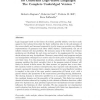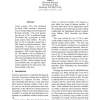99 search results - page 14 / 20 » Objective Bayesianism with predicate languages |
114
Voted
JSC
2010
15 years 1 months ago
2010
Negation is intrinsic to human thinking and most of the time when searching for something, we base our patterns on both positive and negative conditions. This should be naturally ...
112
Voted
CORR
2004
Springer
15 years 2 months ago
2004
Springer
Logic languages based on the theory of rational, possibly infinite, trees have much appeal in that rational trees allow for faster unification (due to the safe omission of the occ...
100
Voted
EACL
2006
ACL Anthology
15 years 4 months ago
2006
ACL Anthology
GOD (General Ontology Discovery) is an unsupervised system to extract semantic relations among domain specific entities and concepts from texts. Operationally, it acts as a search...
98
Voted
OOPSLA
2005
Springer
15 years 8 months ago
2005
Springer
As a value flows across the boundary between interoperating languages, it must be checked and converted to fit the types and representations of the target language. For simple f...
131
click to vote
EMNLP
2009
15 years 13 days ago
2009
Virtual evidence (VE), first introduced by (Pearl, 1988), provides a convenient way of incorporating prior knowledge into Bayesian networks. This work generalizes the use of VE to...


